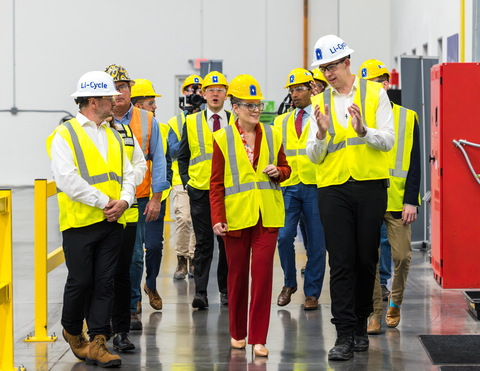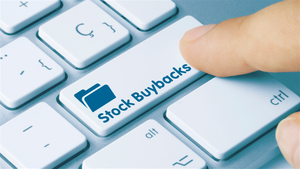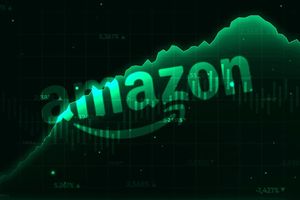Li-Cycle Holdings Corp. (NYSE: LICY) (“Li-Cycle” or the “Company”), an industry leader in lithium-ion battery resource recovery and the leading lithium-ion battery recycler in North America, was honoured to host Katie Hobbs, the Governor of Arizona, at the Company’s lithium-ion battery recycling facility located in Gilbert, Arizona.
This press release features multimedia. View the full release here: https://www.businesswire.com/news/home/20230629351795/en/

Arizona Governor Katie Hobbs and Li-Cycle Co-Founder and Executive Chair Tim Johnston at the company’s Spoke facility in Gilbert, Arizona discussing Li-Cycle’s sustainable and safe process to recycle lithium-ion batteries. (Photo: Business Wire)
During the visit, the Governor was joined by Tim Johnston, Li-Cycle’s co-founder and Executive Chair, for a tour of Li-Cycle’s Spoke facility, which leverages innovative technology to recycle lithium-ion battery materials. The Company’s proprietary submerged shredding recycling process has the capability to process full electric vehicle (EV) and energy storage battery packs without any manual disassembly or discharging, and can recycle all types of lithium-ion battery materials regardless of chemistry or form factor.
Li-Cycle’s Arizona Spoke facility, which can recycle up to of 18,0001 tonnes of lithium-ion battery material per year, is expected to play a key role in building a clean energy future in the U.S. and support the continued growth of the expanding lithium-ion battery supply chain in the state. During the visit and tour, the leaders exchanged views on the importance of safe, efficient, and environmentally friendly battery recycling and the clean tech industry in Arizona.
"Li-Cycle's lithium-ion battery recycling is critical to powering our future economy, and their Gilbert facility is a large part of our blossoming clean tech and manufacturing ecosystem in the East Valley,” said Governor Katie Hobbs. “This company is yet another example of how Arizona is a leader in green manufacturing, and is building a robust clean energy economy.”
“We were delighted to have the opportunity to host Governor Hobbs at our Spoke facility in Gilbert, Arizona and showcase our safe, sustainable and innovative technology for recycling lithium-ion battery material,” said Tim Johnston, co-founder and Executive Chair of Li-Cycle. “Li-Cycle continues to play a key role in driving the growth of a more sustainable battery ecosystem and EV supply chain in Arizona and across the U.S. We are excited to continue working closely with the local community to build a cleaner, domestic supply chain of key battery-grade materials to support the transition to electrification.”
About Li-Cycle Holdings Corp.
Li-Cycle (NYSE: LICY) is a leading global lithium-ion battery resource recovery company and North America’s largest pure-play lithium-ion battery recycler, with a rapidly growing presence across Europe. The Company leverages its innovative, sustainable and patented Spoke & Hub Technologies™ to provide a safe, scalable, customer-centric solution to recycle all different types of lithium-ion batteries. Established in 2016, and with major customers and partners around the world, Li-Cycle recovers critical battery-grade materials to create a domestic closed-loop battery supply chain for a clean energy future. For more information, visit https://li-cycle.com/.
Forward-Looking Statements
Certain statements contained in this press release may be considered “forward-looking statements” within the meaning of the U.S. Private Securities Litigation Reform Act of 1995, Section 27A of the U.S. Securities Act of 1933, as amended, Section 21 of the U.S. Securities Exchange Act of 1934, as amended, and applicable Canadian securities laws. Forward-looking statements may generally be identified by the use of words such as “believe”, “may”, “will”, “continue”, “anticipate”, “intend”, “expect”, “should”, “would”, “could”, “plan”, “potential”, “future”, “target” or other similar expressions that predict or indicate future events or trends or that are not statements of historical matters, although not all forward-looking statements contain such identifying words. Forward-looking statements in this press release include but are not limited to statements about: the expectation that Li-Cycle’s Arizona Spoke facility will play a key role in building a clean energy future in the U.S. and support the continued growth of the expanding lithium-ion battery supply chain in the state; the expectation that Li-Cycle will continue to play a key role in driving the growth of a more sustainable battery ecosystem and EV supply chain in Arizona and across the U.S.; and the expectation that Li-Cycle will continue working closely with the local community to build a cleaner, domestic supply chain of key battery-grade materials to support the transition to electrification. These statements are based on various assumptions, whether or not identified in this communication, including but not limited to assumptions regarding the timing, scope and cost of Li-Cycle’s projects; the processing capacity and production of Li-Cycle’s facilities; Li-Cycle’s ability to source feedstock and manage supply chain risk; Li-Cycle’s ability to increase recycling capacity and efficiency; Li-Cycle’s ability to obtain financing on acceptable terms; Li-Cycle’s ability to retain and hire key personnel and maintain relationships with customers, suppliers and other business partners; general economic conditions; currency exchange and interest rates; compensation costs; and inflation. There can be no assurance that such estimates or assumptions will prove to be correct and, as a result, actual results or events may differ materially from expectations expressed in or implied by the forward-looking statements.
These forward-looking statements are provided for the purpose of assisting readers in understanding certain key elements of Li-Cycle’s current objectives, goals, targets, strategic priorities, expectations and plans, and in obtaining a better understanding of Li-Cycle’s business and anticipated operating environment. Readers are cautioned that such information may not be appropriate for other purposes and is not intended to serve as, and must not be relied on, by any investor as a guarantee, an assurance, a prediction or a definitive statement of fact or probability.
Forward-looking statements involve inherent risks and uncertainties, most of which are difficult to predict and many of which are beyond the control of Li-Cycle, and are not guarantees of future performance. Li-Cycle believes that these risks and uncertainties include, but are not limited to, the following: Li-Cycle’s inability to economically and efficiently source, recover and recycle lithium-ion batteries and lithium-ion battery manufacturing scrap, as well as third party black mass, and to meet the market demand for an environmentally sound, closed-loop solution for manufacturing waste and end-of-life lithium-ion batteries; Li-Cycle’s inability to successfully implement its global growth strategy, on a timely basis or at all; Li-Cycle’s inability to manage future global growth effectively; Li-Cycle’s inability to develop the Rochester Hub, and other future projects including its Spoke network expansion projects in a timely manner or on budget or that those projects will not meet expectations with respect to their productivity or the specifications of their end products; Li-Cycle’s failure to materially increase recycling capacity and efficiency; Li-Cycle may engage in strategic transactions, including acquisitions, that could disrupt its business, cause dilution to its shareholders, reduce its financial resources, result in incurrence of debt, or prove not to be successful; one or more of Li-Cycle’s current or future facilities becoming inoperative, capacity constrained or if its operations are disrupted; additional funds required to meet Li-Cycle’s capital requirements in the future not being available to Li-Cycle on acceptable terms or at all when it needs them; Li-Cycle expects to continue to incur significant expenses and may not achieve or sustain profitability; problems with the handling of lithium-ion battery cells that result in less usage of lithium-ion batteries or affect Li-Cycle’s operations; Li-Cycle’s inability to maintain and increase feedstock supply commitments as well as securing new customers and off-take agreements; a decline in the adoption rate of EVs, or a decline in the support by governments for “green” energy technologies; decreases in benchmark prices for the metals contained in Li-Cycle’s products; changes in the volume or composition of feedstock materials processed at Li-Cycle’s facilities; the development of an alternative chemical make-up of lithium-ion batteries or battery alternatives; Li-Cycle’s revenues for the Rochester Hub are derived significantly from a single customer; Li-Cycle’s insurance may not cover all liabilities and damages; Li-Cycle’s heavy reliance on the experience and expertise of its management; Li-Cycle’s reliance on third-party consultants for its regulatory compliance; Li-Cycle’s inability to complete its recycling processes as quickly as customers may require; Li-Cycle’s inability to compete successfully; increases in income tax rates, changes in income tax laws or disagreements with tax authorities; significant variance in Li-Cycle’s operating and financial results from period to period due to fluctuations in its operating costs and other factors; fluctuations in foreign currency exchange rates which could result in declines in reported sales and net earnings; unfavorable economic conditions, such as consequences of the global COVID-19 pandemic; natural disasters, unusually adverse weather, epidemic or pandemic outbreaks, cyber incidents, boycotts and geo-political events; failure to protect or enforce Li-Cycle’s intellectual property; Li-Cycle may be subject to intellectual property rights claims by third parties; Li-Cycle’s failure to effectively remediate the material weaknesses in its internal control over financial reporting that it has identified or if it fails to develop and maintain a proper and effective internal control over financial reporting. These and other risks and uncertainties related to Li-Cycle’s business are described in greater detail in the section entitled “Risk Factors” and “Key Factors Affecting Li-Cycle’s Performance” in its Annual Report on Form 20-F filed with the U.S. Securities and Exchange Commission and the Ontario Securities Commission in Canada. Because of these risks, uncertainties and assumptions, readers should not place undue reliance on these forward-looking statements. Actual results could differ materially from those contained in any forward-looking statement.
Li-Cycle assumes no obligation to update or revise any forward-looking statements, except as required by applicable laws. These forward-looking statements should not be relied upon as representing Li-Cycle’s assessments as of any date subsequent to the date of this press release.
______________________
1 Total processing capacity includes main line and ancillary processing.
View source version on businesswire.com: https://www.businesswire.com/news/home/20230629351795/en/
Contacts
Investor Relations
Nahla A. Azmy
Sheldon D’souza
investors@li-cycle.com
Media
Louie Diaz
media@li-cycle.com






